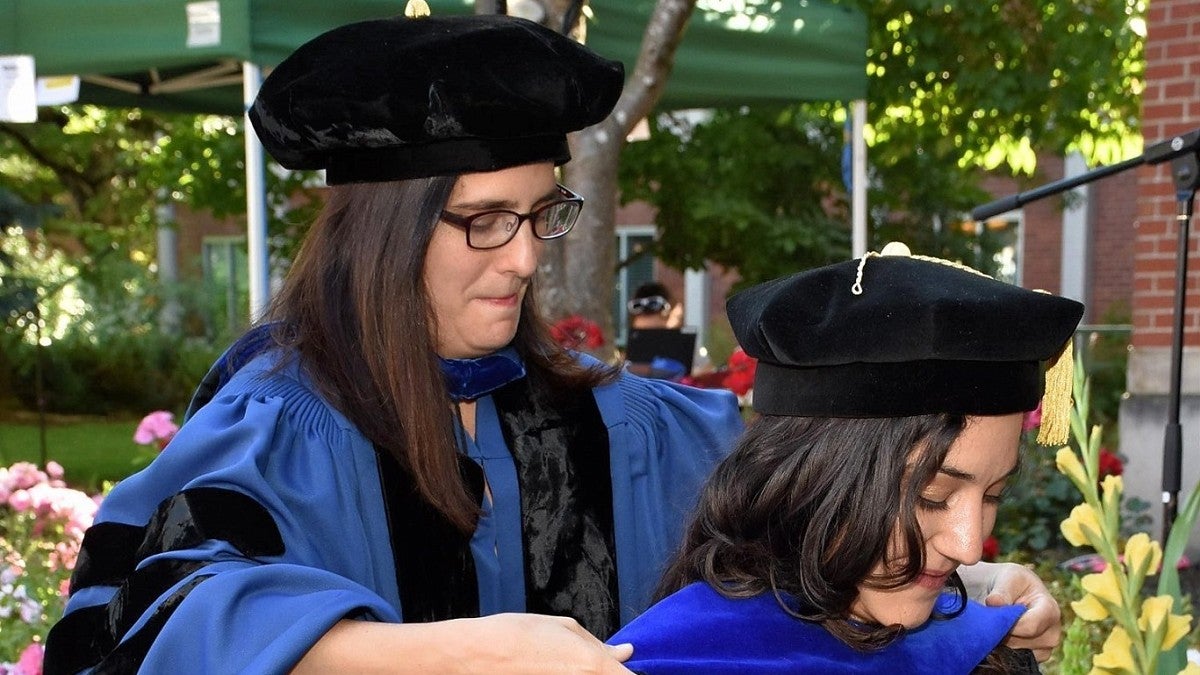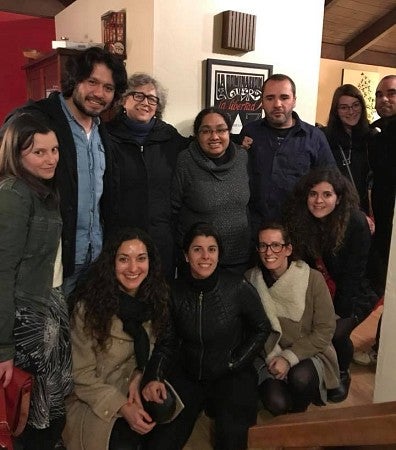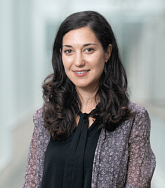
Oregon Ducks come from all over the world, including the Basque Country, a small region carved out of northern Spain on the border with France. It has a distinct culture from surrounding countries, including its own language, customs, festivals and music. It is also the birthplace of University of Oregon alum Nagore Sedano Naveira. Its overlap of cultures planted a seed that influenced her decision to travel and explore the world, and to eventually move to the Pacific Northwest.
Sedano Naveira, now an assistant professor in the Department of Hispanic Studies at the University of Puget Sound, graduated from UO’s College of Arts and Sciences in 2019 with a doctorate in Romance languages and a graduate certificate in women’s and gender studies.
Being from Basque Country, studying abroad in England and then attending the University of Nevada, Reno, for her master’s degree, UO wasn’t on Sedano Naveira’s radar. That is until she met a UO alum who spoke so highly of the university she decided to add it to her list of potential programs for her doctorate.
As luck would have it, Cecilia Enjuto Rangel, associate professor of romance languages at the UO, was very welcoming and supportive when she reached out.
“That was actually what did the trick. It was just one professor responding in such a thoughtful, encouraging, supportive way to my email,” said Sedano Naveira. “I decided — if I am going to commit myself to six or seven years of grad school — I want to be working with people who really give 100% to their students.”

CAS’s Department of Romance Languages offers a wide variety of programs and fields of study that examine the languages, literatures and cultures of French, Italian, Portuguese and Spanish-speaking countries. Sedano Naveira said many of the Iberian and Latin American studies programs that she reached out to didn’t have a transatlantic approach to the literary production of Spain and Latin America, or the ability to evolve and grow one’s dissertation research focus outside of rigid disciplinary boundaries.
“In Oregon, I felt that there was an openness to give that a chance. You want to feel like you have that freedom and support,” she said.
Another factor that made the doctorate program stand out to her was that the professors have interdisciplinary backgrounds, which benefited her academic success greatly in her advanced seminars on literary and cultural studies.
CAS language programs emphasize the importance of looking at all aspects of the cultural and literary production of a given region. Sedano Naveira said her professors thought very outside the box and made interesting connections between different countries, time periods, media, film and memoirs.
Another piece of this doctorate program is that the faculty train their students to be a professor of Iberian and Latin American studies. A large part of that process is learning to teach introductory Spanish language courses. That teacher training aspect of the program, and the integration of the cultures of Spanish-speaking communities into the language learning process, is something that sets this program apart from the rest.
“It was an opening — like a world unfolding before me. The way the professors teach is a style of its own. It’s genuinely innovative and very groundbreaking,” she said.
Sedano Naveira saw the benefits of incorporating cultural studies into the language learning process in real time during her time as a graduate teaching assistant.
“You think all the programs across countries know language is not just a language, it’s language and culture — and those two go hand in hand, but no. Most of the schools are still catching up to that.”
Her advisor at the UO, Enjuto Rangel, as well as professors Gina Herrmann and Lanie Millar, helped her push through hard times and were there to hold her hand when she needed support. As an international student navigating the complex US immigration system, she explained that the people who worked at the international office were also crucial to her experience.
“They can make a big difference — it’s like night and day,” she said.
One of the most valuable takeaways from her time at the UO was the way her mentors and advisors adequately prepared her to be a caring educator with up-to-date teaching methods. She said the UO gave her the tools to have a successful career as an educator — and “to meet the students where they’re at in a way that challenges them.”
She also completed a graduate certificate in women’s studies during her time at UO and values the way she could incorporate that new knowledge into her language research. The combination of the feminist theory and transatlantic literary studies inspired her to write her first book, Gendered Gestures: The Exile of 1939 and Spain’s Colonial Past.

“This baby was conceived at U of O. It’s very much a product of my time there, the professors I encountered and the courses I took,” she said.
The book focuses on the memoirs of four Spanish and Basque women who went into exile to Latin America after losing the Spanish Civil War (1936-1939). Sedano Naveira is not only examining how Spain’s colonial past shaped the way these women remember their own past through their memoirs, but also how we remember these stories — and what that says about us as a society today.
Dr. Sedano Naveira’s advice to prospective graduate and doctoral students is to “choose wisely who you want to work with, because if you’re going to spend years of your life working with a person on one topic, you definitely want to feel that you have good support with that person. Reach out and don’t be afraid to ask questions.”
— By Kendall Baldwin, College of Arts and Sciences
